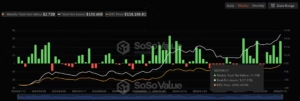The Dow Jones Industrial Average experienced a remarkable surge, climbing more than 1,100 points on Monday, marking a significant rebound in the stock market. This surge was primarily driven by the announcement of major tariff reductions between the U.S. and China, which have both promised to ease trade tensions. The positive sentiment extended beyond the Dow, with the S&P 500 jumping 3.25%, the Nasdaq Composite rising 4.34%, and the Russell 2000 increasing by 3.56%.
Technology and retail sectors saw the most impressive gains, reflecting their significant exposure to Chinese markets. Companies such as Tesla, Apple, and Amazon led the charge, with stock prices rising 7%, 6%, and 8%, respectively. The optimism in the market indicates a strong recovery, especially after recent volatility triggered by President Trump’s tariffs on Chinese imports.
During high-stakes negotiations held in Geneva, both nations agreed to lower the U.S. tariffs on Chinese goods from a staggering 145% to 30%, while China reduced its retaliatory tariffs on U.S. imports to 10%. Treasury Secretary Scott Bessent deemed the discussions as “very productive,” hinting at further potential negotiations in the upcoming weeks. Meanwhile, Trump referred to the agreement as a “total reset” of U.S.-China trade relations.
Despite this sudden upswing in the financial markets, the price of Bitcoin experienced a notable decline. After nearly hitting $106,000, Bitcoin retreated 2.75% to approximately $100,771 on Monday afternoon. Analysts suggested that the temporary suspension of tariffs eased macroeconomic uncertainties but led traders to “sell the news” following a robust rally from the month’s low of under $75,000. This downturn in Bitcoin suggests that its recent outperformance may be stalling as traditional equities begin to reclaim their footing.
The rollback of tariffs will remain effective for a period of 90 days, allowing both parties to work towards a more comprehensive trade agreement. This timeline reflects the continued significance of trade relations between the two largest economies in the world. The economic indicators, such as the $7.6 billion in duties collected last month by the U.S. Treasury, highlight the financial implications of these trade disruptions and the critical changes needed to stabilize market confidence.






